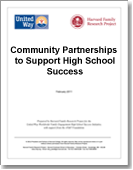The Harvard Family Research Project separated from the Harvard Graduate School of Education to become the Global Family Research Project as of January 1, 2017. It is no longer affiliated with Harvard University.

|
February 2011 Community Partnerships to Support High School SuccessHarvard Family Research Project |
Article Information
- Full Text (HTML)
- Full Text (PDF: 184 kb)
Graduation and dropout rates are the center of the conversation about high school reform, with President Obama and the U.S. Department of Education leading the charge to boost high school and college graduation rates among our nation’s students in the next ten years. Recognizing the need for a comprehensive approach to keeping teens in school and successfully completing high school, the AT&T Foundation awarded the United Way Worldwide (UWW) a grant to start a new initiative—Family Engagement for High School Success. The goal of this grant was to identify promising family engagement strategies with a strong likelihood of raising high school graduation rates, and to share that information with communities around the country. Together with Harvard Family Research Project, UWW worked with local United Way chapters across the country to develop plans for high school success.
The planning process made possible by this initiative was innovative and unique. It helped strengthen schools’ and communities’ action plans by emphasizing a holistic view of students in which families supported and advocated for their successful journey to high school graduation. By adopting an outcome-focused approach and using local data, local United Way sites designed different models of family engagement that removed barriers and built stronger connections between families, schools, and communities.
The process also engaged school and community partners for buy-in, as well as empowered parents and students to take an active role in planning so that strategies would address their real needs and interests. This was the first time in these communities that all stakeholders participated in developing strategies to boost high school graduation rates, which resulted in action plans that had true potential for success. In all, 15 United Way chapters and their surrounding communities participated in the planning process, and 8 of them are implementing their plans beginning in the 2010–2011 academic year.
This report profiles eight of the sites, highlighting:
- Family, school, and community participation in this planning process.
- Innovative approaches and strategies to enhance family and community engagement and improve student outcomes.
- Early successes that emerged during the planning phase.
- The identification of measurable outcomes for year one (end of the focal students' 9th grade year) and year four (end of the focal students' 12th grade year).
For more information about this initiative and HFRP's evaluation work with United Way Worldwide, visit the Family Engagement for High School Success project page.
And stay tuned as the sites begin to put their plans into action and see which strategies emerge as the most effective to boost high school success in their communities. A forthcoming Planning and Implementation Toolkit will further detail the project, with the intent of helping other communities to take action.
